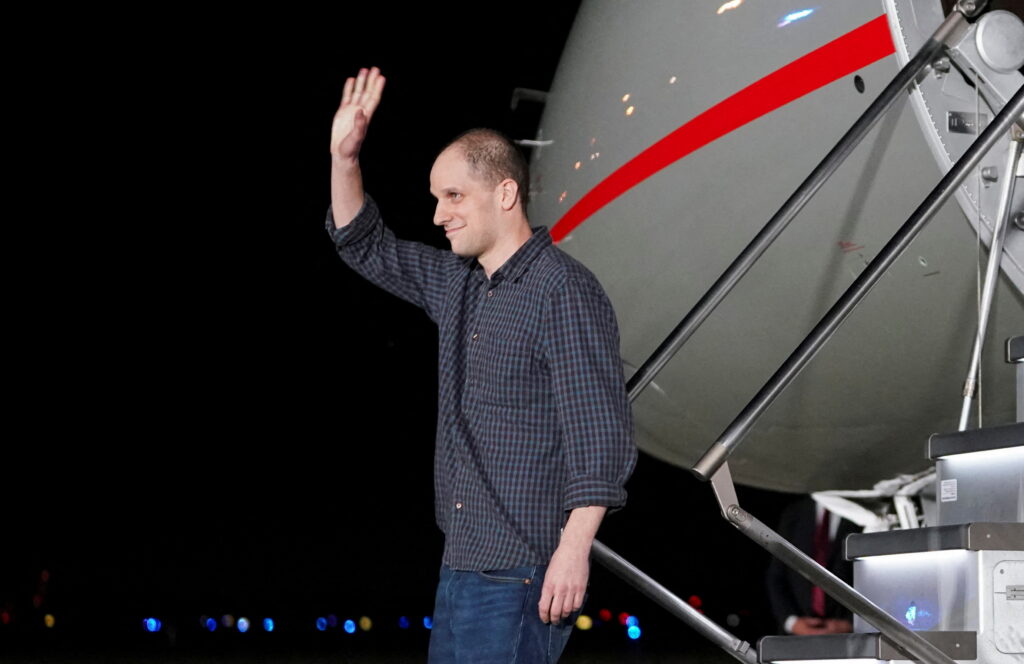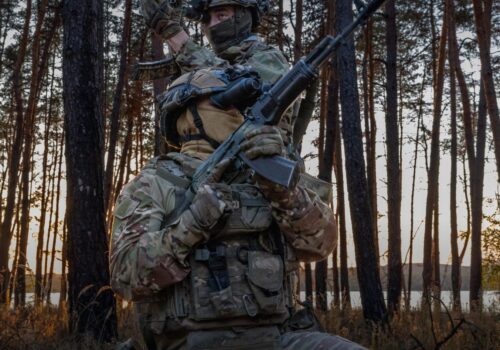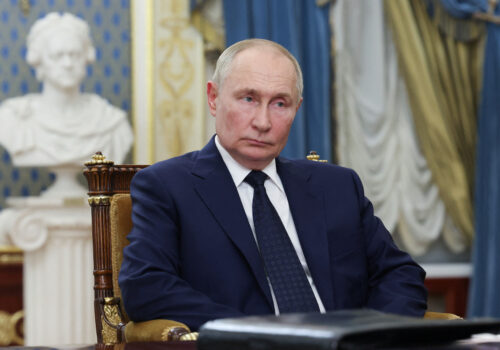A year ago, the Atlantic Council honored German Chancellor Olaf Scholz at our Global Citizen Awards. Scholz spoke from the stage about how Russia’s war of aggression led to his country’s Zeitenwende, or turning point, on national security and a deepening of transatlantic ties. But the most important moment of the night came in a small back room when Scholz met the parents of Evan Gershkovich, the Wall Street Journal reporter then imprisoned in Russia.
Little did we know at the time that this encounter would play a modest but, it turns out, vital role in gaining Evan’s release.
At some point the book should be written, one hopes by Evan himself, on his shameful and unjustified 491-day imprisonment and ultimate conviction on espionage charges, which called for a sixteen-year sentence.
The book will include President Vladimir Putin’s choice to hold Evan for entirely cynical reasons, intending to provide a pawn for a future prisoner exchange to recover mislaid Russian chess pieces.
The final exchange, one of historical dimensions both in the number of those released and the complexity of the negotiation, involved a host of actors that included Scholz, Turkish President Recep Tayyip Erdoğan, and Slovenian Prime Minister Robert Golob. It also involved Almar Latour, publisher of the Wall Street Journal and CEO of Dow Jones (and an Atlantic Council board member); Wall Street Journal Editor in Chief Emma Tucker; Dow Jones general counsel Jason Conti; private lawyers at WilmerHale engaged by Dow Jones; US President Joe Biden; National Security Advisor Jake Sullivan; Special Presidential Envoy for Hostage Affairs Roger Carstens; and Evan’s parents, Ella Milman and Mikhail Gershkovich, among others.
Wall Street Journal reporters Joe Parkinson, Drew Hinshaw, Bojan Pancevski, and Aruna Viswanatha told the story in a compelling reconstruction on August 1, but it will take further investigation to reveal all the elements and stages of this true-life thriller.
Here’s the inside story on the Atlantic Council’s part in the drama.
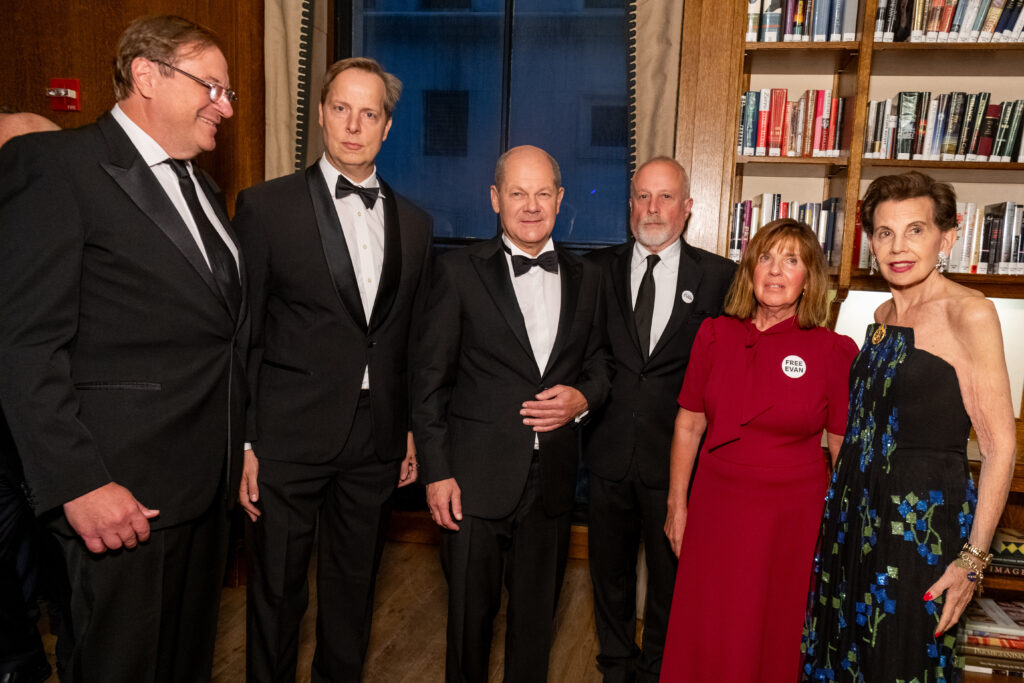
Black-tie back channel
For more than a year, multiparty negotiations for the release of Evan and other prisoners held in Russia had taken place behind the scenes. Our role in this story began almost from the day of Evan’s imprisonment. It included a number of public and private support efforts, most prominently the launching of a regular convening called Reporters at Risk, an initiative of Atlantic Council Board Executive Vice Chair Adrienne Arsht and our Scowcroft Center for Strategy and Security. Each event contained an element shining a light on Evan’s plight and rallying support, including a full-page ad in the Wall Street Journal.
At the Global Citizen Awards dinner in September 2023, we honored Scholz alongside Ukrainian President Volodymyr Zelenskyy, Japanese Prime Minister Fumio Kishida, US Treasury Secretary Janet Yellen, and Hong Kong business leader Victor Chu. Latour asked me to invite Evan’s parents to our awards dinner in the hope that we could introduce them to Scholz.
Just an hour before the event, WilmerHale lawyer Robert Kimmitt—the former US ambassador to Germany, deputy secretary of the US Treasury, and long-time friend of mine—phoned me to request that Evan’s parents be invited into a small gathering of the honorees and their introducers that included Scholz.
“It was there where [Scholz] expressed his support for Evan—a key moment in a lengthy saga that culminated in last week’s prisoner exchange,” Latour wrote me days after Evan was freed in August 2024. Latour said that moment reflected the Atlantic Council’s “essential strengths and accomplishments: its global community of leaders who trust the organization and use it as a platform to connect with one another.” Perhaps the most crucial piece that unlocked Russian willingness to make the deal was Scholz’s willingness to trade Vadim Krasikov, a convicted killer who gunned down an opponent of the Russian regime who was seeking asylum in Germany. It was a courageous move by Scholz, one that would put domestic political heat on him but save lives.
The decision, said Scholz, was based on “balancing the interest of the state in enforcing the sentence with the freedom and the risks to the health and, in some cases, to the lives of innocent people detained in Russia.” The most tragic moment in this saga for those most deeply involved came in February 2024, when news broke that Russian dissident Alexei Navalny had died in a Russian prison, as negotiators were working to include him in an exchange. He was the individual whom German leaders most wanted free—and whose freedom posed the greatest potential political threat to Putin.
The true nature of his death might never be known. But one of those involved in the final prisoner exchange, speaking on the condition of anonymity, shared with me Navalny’s potential involvement in a prisoner release and well-founded suspicions that Putin had Navalny killed to remove that option from the chessboard.
When the final exchange took place nearly six months later, those involved whom Putin wanted free included Russian security services hit man Krasikov, hackers Vladislav Klyushin and Roman Seleznev, and spies Artem Dultsev and Anna Dultseva. Those whose freedom was gained by Western negotiators included Evan, former Marine Paul Whelan, journalist Alsu Kurmasheva, and opposition figure Vladimir Kara-Murza.
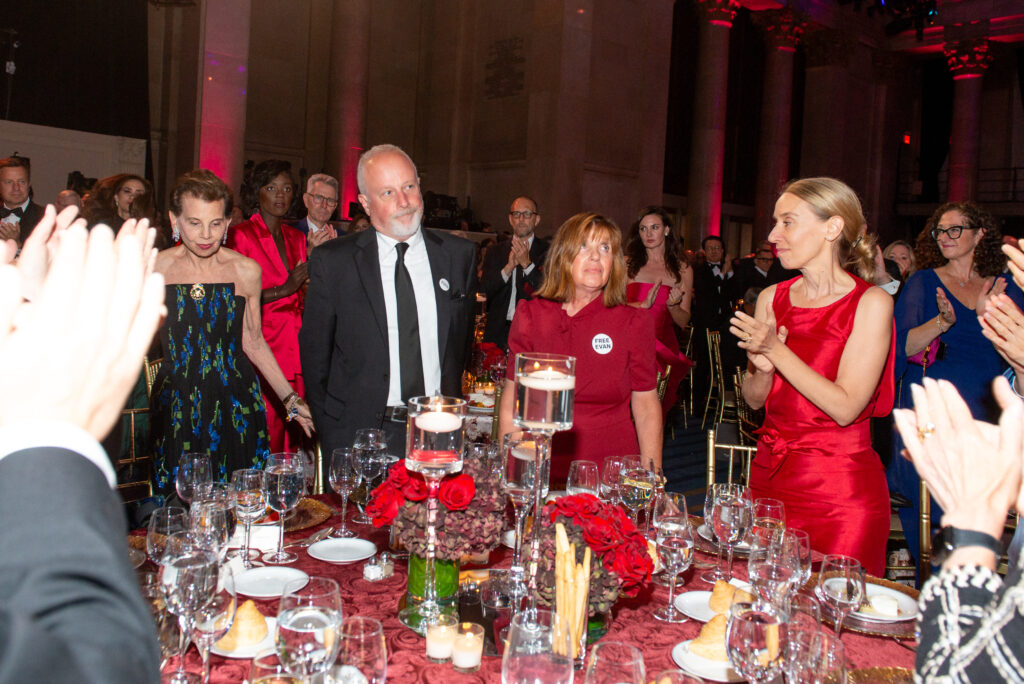
An unfair trade
Latour understood what Evan’s release, in particular, meant to me as a veteran of more than twenty-five years at the Wall Street Journal. It was during my leadership as editor and associate publisher at the Wall Street Journal Europe that my reporting colleague Daniel Pearl was taken hostage by terrorists in Pakistan and ultimately beheaded. I will never stop asking whether I and others could have done more to save him from that horror.
Perhaps not, but the question was motivation enough in this far different situation, involving a sovereign state, for Latour—who as a young news assistant sat a few desks away from Pearl at the Journal bureau in Washington, DC—the Dow Jones leadership team, and many others to leave no stone unturned. That included frequent visits by Latour and others to the White House and the State Department, flying Evan’s parents to Davos for the World Economic Forum’s annual meeting, where they met with media and Secretary of State Antony Blinken, and a trip to Berlin where Latour, Conti, and a WilmerHale lawyer engaged with Wolfgang Schmidt, Scholz’s influential head of chancellery and federal minister for special affairs, building on the New York exchange.
I’m delighted our modest role helped. I was deeply touched by Latour’s personal letter to me, which said: “As a veteran of multiple decades at the Journal, you made many contributions to the world’s greatest news organization,” adding that through the Atlantic Council’s contributions to Evan’s release, “[you] perhaps made your greatest contribution yet to your former newsroom.”
We are all overjoyed that Evan, Paul, Alsu, Vladimir, and others are home. But it’s worth remembering that this was an inherently unfair trade—killers and criminals for innocents and freedom fighters. It released bad people who will continue to do bad things and good people who now can continue to contribute to a better world. The worst part of it is that our willingness in civilized societies to care so much for our unfairly imprisoned provides only greater motivation for further misbehavior. Government leaders and those of us in civil society must continue to reflect and develop ideas on how to break this dangerous cycle.
When the Global Citizen Awards convene again on Monday in New York, we’ll honor Ghanaian President Nana Addo Dankwa Akufo-Addo, Greek Prime Minister Kyriakos Mitsotakis, Italian Prime Minister Giorgia Meloni, and South Korean-American entertainment executive Miky Lee. On Tuesday, we will host another Reporters at Risk event at our Global Future Forum in New York, featuring Jason Rezaian, the Washington Post journalist who was unjustly imprisoned in Iran.
Perhaps nothing quite so significant will take place this year at our annual gathering in New York. From the stage at the Global Citizen Awards, we’ll make mention of Evan’s parents’ presence the year before in our front row and their not-so-chance meeting with Scholz. We’ll then join in applauding Evan’s character, courage, and resilience—and his return to practicing the pursuit of truth.
Frederick Kempe is president and chief executive officer of the Atlantic Council. You can follow him on X: @FredKempe.
This edition is part of Frederick Kempe’s Inflection Points newsletter, a column of dispatches from a world in transition. To receive this newsletter throughout the week, sign up here.
Further reading
Wed, Sep 18, 2024
Dispatch from Kyiv: The Kursk offensive is working, but Ukrainians are worried about US wobbling
New Atlanticist By John E. Herbst
Morale in Kyiv has been boosted by the early success of the incursion into Kursk, but tempered by concerns over US support.
Tue, Sep 17, 2024
Putin is becoming entangled in his own discredited red lines
UkraineAlert By Peter Dickinson
Putin is attempting to impose a new red line over the use of Western long-range missiles inside Russia, but Ukraine has already been using these weapons in occupied regions claimed by Russia for more than a year, writes Peter Dickinson.
Tue, Sep 17, 2024
Time to make Russia worry about the West’s red lines in Ukraine
UkraineAlert By
Even talking about Western red lines in Ukraine will no doubt be seen as too provocative by some, but it is now obvious that allowing Russia uncontested escalation dominance has been a costly blunder, writes Mykola Bielieskov.
Image: US journalist Evan Gershkovich, who was released from detention in Russia, waves upon his arrival at Joint Base Andrews in Maryland, U.S., August 1, 2024. REUTERS/Nathan Howard.
